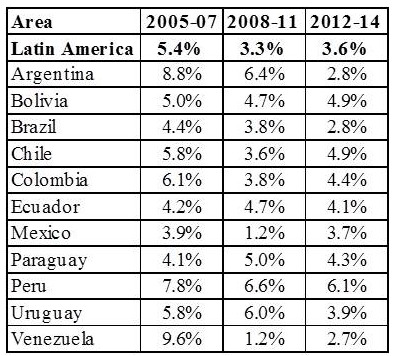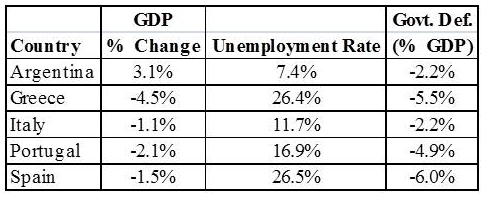A couple of weeks back, an American friend living in Buenos Aires asked me: “Have you been following this crazy woman? I would love to hear your take on her.” In what follows, I offer a little background on the Argentina’s financial situation and review the most controversial actions President Kirchner has taken. I conclude with a prescription for the future of the country.
The Financial Situation of Argentina – Not the Lady’s Fault
Argentina’s debt to GDP ratio of 43% is not high by international standards. But troubling problems remain following the country’s 2001 default on $132 billion of debt. According to a Reuters report, 92% of Argentina’s defaulted bonds were restructured in 2005 and 2010 with bondholders receiving 25 to 29 cents on the dollar. But there were holdouts. And a New York Court ruled in March that further payments could not be made to the bondholders who did settle until a deal is negotiated and payments are made to those still holding out. However, a failure to pay those who did settle would constitute a default and violate the 2005 and 2010 agreements. This would most definitely not be good.
The holdouts are owed $1.3 billion. And in a court of law, their position is quite strong: they have a loan agreement and want to be paid in accordance with the terms set forth in the agreement. In such cases, it is common for courts to allow the claimants to attach other assets of the debtor. As a consequence, the Lady has resorted to chartering a plane rather than use one owned by Argentina for out-of-country flights.
In this case, the New York Court ordered Argentina to come up with a proposal to settle with the holdouts. Argentina responded by saying it will make payments to the holdouts on pretty much the same terms it settled on with its other bondholders. The lawyer for Argentina said the country has a law that keeps new governments from improving the terms of previous restructurings. The Court has given the holdouts until the end of April to review and respond to the Argentine proposal. But Elliott Management, one of the largest holdouts, has already said it will not accept the 2010 terms.
The uncertainty surrounding this issue makes Argentina’s financial position quite precarious – nobody in the right mind would lend Argentina money unless it was secured by something that could be seized – like commodities.
Seizing the Pension Funds
And yes, a few years back, the Lady did take over the country’s pension funds. Kirchner’s opposition claimed this was done so pension monies could be used to “award” provincial governors for political support. Maybe this is true. But there were economic reasons for the government to take control of the funds: not performing well, not invested in Argentina, and rumors of corruption.
How About the Repsol Takeover?
In the “civilized world” government takeovers are generally frowned on. But as I have reported, there were mitigating circumstances in the Repsol case. Keep in mind that a country’s energy strategy is fundamental to its well-being. And Argentina is an extreme case inasmuch as it cannot borrow on world markets. That means it is extremely important to keep its trade and current account balances from going negative. Table 1 shows that Argentina’s energy imports are growing rapidly.
Table 1. – Argentina: Energy Import Shares
Kirchner wanted Repsol to develop Argentine energy reserves so it could cut back on its imports. Repsol had other priorities.
The Lady’s Shortcomings
While one can argue the problems discussed above are not the Lady’s doing, what follows are her responsibility.
a. Falsifying Inflation Data
The Argentine rate of inflation has grown in part because Kirchner reversed the long-standing tradition of federal subsidies for critical services including public transit and basic utilities. Most economists would applaud this move.
But the continuing falsification of inflation data and the intimidation of anyone who questioned the data have taken on a life of its own. The International Monetary Fund has censured Argentina for these actions. It has given Argentina until Sept. 29 to implement reforms before it risks losing membership privileges. If Argentina does not comply, it would be the second country to be forced out for failing to provide accurate economic information. The former Czechoslovakia was kicked out for the same reason in 1954.
Why does the Lady continue this charade? Is it because, as the Palisades Hudson Group claims, that by reporting inflation lower than it really is, the country has avoided paying the full interest due on its $37.6 billion of inflation-linked bonds. Is this a legitimate reason for falsifying the data? Of course not.
Just how much falsification is taking place? To answer this question, I turn to data assembled by LatinFocus, arguably the best source of information on Latin America economies that there is. LatinFocus provides two sets of inflation data:
- Projections made by 25 financial/academic/consulting institutions projections of the falsified government inflation rates (I presume institutions dutifully make projections on this false data because they don’t want the Lady to get angry with them), and
- Projections made by 16 unnamed “panelists”.
The projections for 2013 and 2014 appear in Table 2. If the panelists are right, the inflation rates reported by the government are less than half the actual rates.
Table 2. – Argentina: Inflation Estimates
b. The Peso/Dollar Paranoia
When I was last in Argentina (2009), both Pesos and Dollars were used, and the system worked well. If you had one and wanted the other, you could buy them, and the buying and selling rates were quite close. But the Lady, fearful of running out of dollars, wants everyone to use Pesos. She also appears to be under the illusion that she can “mandate” the exchange rate. Her paranoia on this score has led to:
- requiring that all Argentine real estate transactions be done in Pesos;
- limiting high tech imports into Argentina;
- limiting dollars available for travel outside Argentina;
- charging a tax on credit card charges made outside of Argentina and payable in dollars;
- controlling/limiting payments made to suppliers outside Argentina
- establishing the “official” peso/dollar exchange rate.
This is all crazy nonsense. Whenever one tries to set prices that are out of line with supply/demand forces, a secondary market develops. So Argentina now has the dólar blue secondary market where it will take more than 8 pesos to buy a dollar versus the official rate of 5+ pesos per dollar. So now there are “criminals” making illegal currency exchanges making lots of money. Government policy that encourages such activities is bad government policy.
And what happens if anyone speaks up? The Lady does not like objections: you might get fined or worse….
Explaining the Lady’s Behavior
As is true of most Latam countries, Argentina has a history of military dictators with little regard for free market mechanisms. They like to issue commands to get things done. It reminds me of my first trip to Ghana for the IMF when the military had just ousted Nkrumah and was running the country. The military had no understanding of economics and markets. They were used to commanding things to happen and seeing their commands followed. So if the exchange rate was not to their liking, they would tell the banks and the money traders what the exchange rate should be. Money changers normally worked on the streets near the central bank. If the military did not like the exchange rates being offered by the money changers, they would put a few of them in jail and disperse the others. It never worked. After a few weeks the money changers would return…. I observed the same behavior by Myanmar’s military leaders a couple of decades later.
I think this explains the Lady’s behavior. I also think it is the way Chavez was. They both operate like military generals, using commands and intimidation to get things done. This approach never works. If you don’t let markets clear, a black market will develop allowing criminals to make a lot of money.
The Economic Condition of Argentina
With all that has been reported above, keep in mind that Argentina, like Russia, Argentina is a natural resource rich country. And a lot of its exports are food. The world’s growing population has to eat. I quote from an earlier piece I wrote with Marcela Gonzales on Argentina: “The size and role of government will probably continue to grow (it has grown from 20% of GDP in 2002 to more than 30% now). And political power grabs will probably continue. But at least the first quarter of the 21st Century will be good to natural resource rich countries. And it is hard to imagine things will be bad in Argentina in the long run. Its exports will rebound.”
With this rosy backdrop, let’s look at some economic data. Table 1 provides GDP growth rate data for Argentina and other Latam countries. Both before and during the global recession, Argentina did as well or better than its neighbors. That is now changing. Can a significant portion of the slowdown be attributed to Kirchner’s economic policies? Yes.
Table 3. – Latin America GDP Growth Rates
In recent months, my writings have focused on the “weak sisters” in the Eurozone. The “weak sisters” (Greece, Italy, Portugal, and Spain) are in dire straits: their GDPs are declining and they have high unemployment, large government deficits, and massive government debts. As Table 4 shows, Argentina is not in such straits – not even close!
Table 4. – 2013 Argentina and the “Weak Sisters”: Growth, Unemployment, Government Deficits and Debt
There is one area where Argentina faces problems equal or greater than those facing the “Weak Sisters”. While the European Central Bank and the IMF are providing huge sums to bail out the “sisters”, nobody is eager to help Argentina out. But this is a resolvable problem.
A Prescription for the Future
Argentina has a bright future. The Lady is temporarily taking it in the wrong direction. This can be easily remedied. To start, a group of the country’s best economists working in academia, government and the private sector should draft An Economic Plan for the New President of Argentina. Every major sector in Argentina should be examined with an eye to removing all the foolish policies the Kirchner regimes have enacted. The group should also commission a set of in-depth studies looking at such issues as what the country’s energy strategy should be for the next decade. To protect the group from Kirchner intimidation, it should work obtain support from the international private sector, international organizations and foundations.
Legislative elections take place this fall in Argentina. And a new President will be elected in October 2015. It is time for work on this plan to start.
